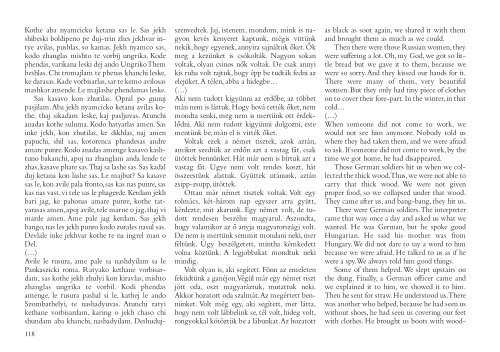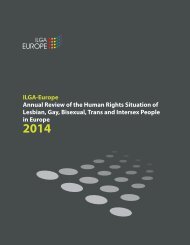You also want an ePaper? Increase the reach of your titles
YUMPU automatically turns print PDFs into web optimized ePapers that Google loves.
118<br />
szen vedtek. Jaj, istenem, mondom, mink is na -<br />
gyon kevés kenyeret kaptunk, mégis vittünk<br />
nekik, hogy egyenek, annyira sajnáltuk ôket. Ôk<br />
meg a kezünket is csókolták. Nagyon sokan<br />
voltak, olyan csinos nôk voltak. De csak annyi<br />
kis ruha volt rajtuk, hogy épp be tudták fedni az<br />
elejüket. A télen, abba a hidegbe…<br />
(…)<br />
Aki nem tudott kigyünni az erdôbe, az többet<br />
mán nem is láttuk. Hogy hová tették ôket, nem<br />
mondta senki, meg nem is mertünk ott érdeklôdni.<br />
Aki nem tudott kigyünni dolgozni, este<br />
mentünk be, mán el is vitték ôket.<br />
Voltak ezek a német tisztek, azok aztán,<br />
amikor szedtük az erdôn azt a vastag fát, csak<br />
ütöttek bennünket. Hát már nem is bírtuk azt a<br />
vastag fát. Ugye nem volt rendes koszt, hát<br />
össze es tünk alattuk. Gyüttek utánunk, aztán<br />
zsipp-zsupp, ütöttek.<br />
Ottan már német tisztek voltak. Volt egy<br />
tolmács, két-három nap egyszer arra gyütt,<br />
kérdezte, mit akarunk. Egy német volt, de tu -<br />
dott rendesen beszélni magyarul. Aszondta,<br />
hogy valamikor az ô anyja magyarországi volt.<br />
De nem is mertünk semmit mondani neki, mer<br />
féltünk. Úgy beszélgetett, mintha kémkedett<br />
volna köztünk. A legjobbakat mondtuk neki<br />
mindig.<br />
Volt olyan is, aki segített. Fönn az emeleten<br />
feküdtünk a ganéjon. Végül már egy német tiszt<br />
jött oda, oszt magyaráztuk, mutattuk neki.<br />
Akkor hozatott oda szalmát. Az megértett bennünket.<br />
Volt még egy, aki segített, mer látta,<br />
hogy nem volt lábbelink se, tél volt, hideg volt,<br />
rongyokkal kötöztük be a lábunkat. Az hozatott<br />
Kothe aba nyamcicko ketana sas le. Sas jekh<br />
shibeski boldipeno pe duj-trin zhes jekhvar in -<br />
tye avilas, pushlas, so kamas. Jekh nyamco sas,<br />
kodo zhanglas mishto te vorbij ungrika. Kode<br />
phendas, varikana leski dej ando Ungriko Them<br />
beshlas. Chi tromajlam te phenas khan chi leske,<br />
ke darasas. Kade vorbisarlas, sar te ke mo avilosas<br />
mashkar amende. Le majlashe phen damas leske.<br />
Sas kasavo kon zhutilas. Opral po gunuj<br />
pasjilam. Aba jekh nyamcicko ketana avilas ko -<br />
the, thaj sikadam leske, kaj pasljuvas. Atunchi<br />
anadas kothe suluma. Kodo hatyarlas amen. Sas<br />
inke jekh, kon zhutilas, ke dikhlas, naj amen<br />
papuchi, shil sas, kotorenca phandesas andre<br />
amare punre. Kodo anadas amenge kasavo kash -<br />
tuno bakanchi, apoj na zhanglam anda lende te<br />
zhas, kasave phare sas. Thaj sa lashe sas. Sas kadal<br />
duj ketana kon lashe sas. Le majbut? Sa kasave<br />
sas le, kon avile pala fronto, sas kas nas punre, sas<br />
kas nas vast, vi tele sas le pha gerde. Kerdam jekh<br />
bari jag, ke pahonas amare punre, kothe tatyarasas<br />
amen, apoj avile, tele marne o jag, thaj vi<br />
marde amen. Ame pale jag kerdam. Sas jekh<br />
bango, nas les jekh punro kodo zurales nasul sas.<br />
Devlale inke jekhvar kothe te na ingrel man o<br />
Del.<br />
(…)<br />
Avile le rusura, ame pale sa nashdyilam sa le<br />
Pan kaszicki roma. Ratyako kethane vorbisardam,<br />
sas kothe jekh zhulyi kon kiravlas, mishto<br />
zhanglas ungrika te vorbil. Kodi phendas<br />
amenge, le rusura pashal si le, kathej le ando<br />
Szombathelyi, te nashadyuvas. Atunchi ratyi<br />
kethane vorbisardam, karing o jekh chaso chi<br />
shundam aba khanchi, nashadyilam. Deshudujas<br />
black as soot again, we shared it with them<br />
and brought them as much as we could.<br />
Then there were those Russian women, they<br />
were suffering a lot. Oh, my God, we got so little<br />
bread but we gave it to them, because we<br />
were so sorry. And they kissed our hands for it.<br />
There were many of them, very beautiful<br />
women. But they only had tiny piece of clothes<br />
on to cover their fore-part. In the winter, in that<br />
cold…<br />
(…)<br />
When someone did not come to work, we<br />
would not see him anymore. Nobody told us<br />
where they had taken them, and we were afraid<br />
to ask. If someone did not come to work, by the<br />
time we got home, he had dis appeared.<br />
Those German soldiers hit us when we collected<br />
the thick wood. Thus, we were not able to<br />
carry that thick wood. We were not given<br />
proper food, so we collapsed under that wood.<br />
They came after us, and bang-bang, they hit us.<br />
There were German soldiers. The interpreter<br />
came that way once a day and asked us what we<br />
wanted. He was German, but he spoke good<br />
Hungarian. He said his mother was from<br />
Hungary. We did not dare to say a word to him<br />
because we were afraid. He talked to us as if he<br />
were a spy. We always told him good things.<br />
Some of them helped. We slept upstairs on<br />
the dung. Finally, a German officer came and<br />
we explained it to him, we showed it to him.<br />
Then he sent for straw. He understood us. There<br />
was another who helped, because he had seen us<br />
without shoes, he had seen us covering our feet<br />
with clothes. He brought us boots with wood-



